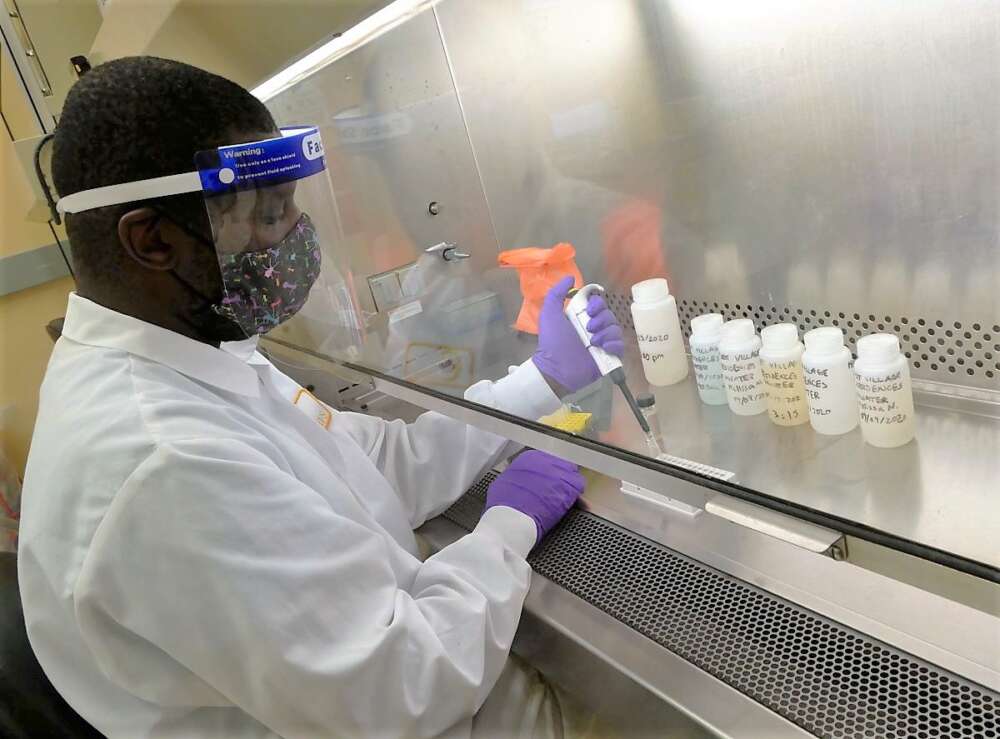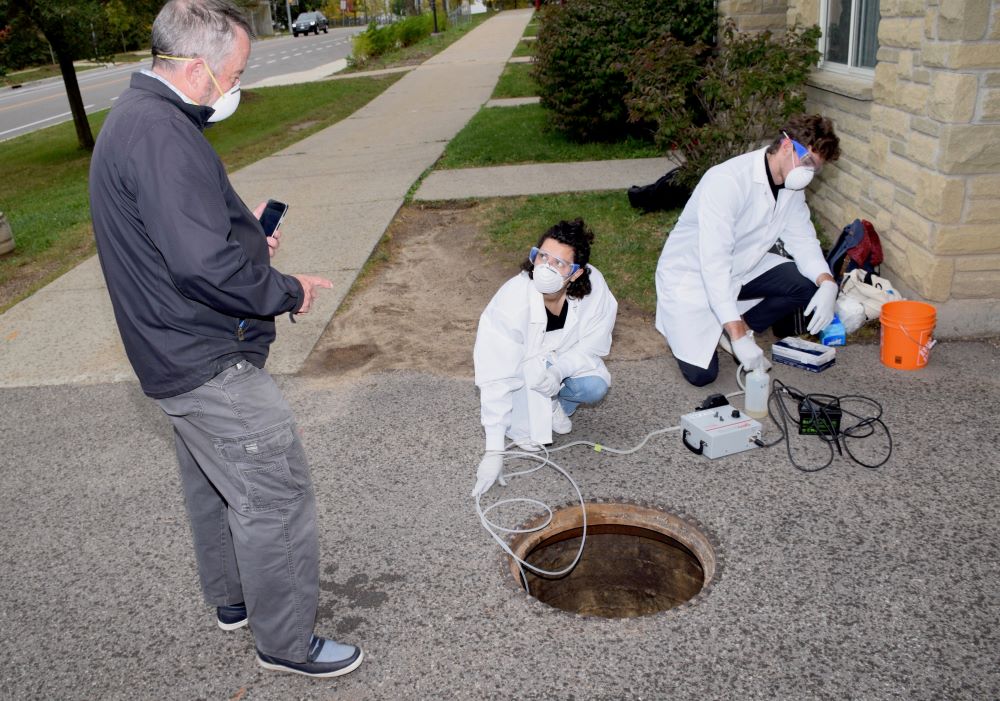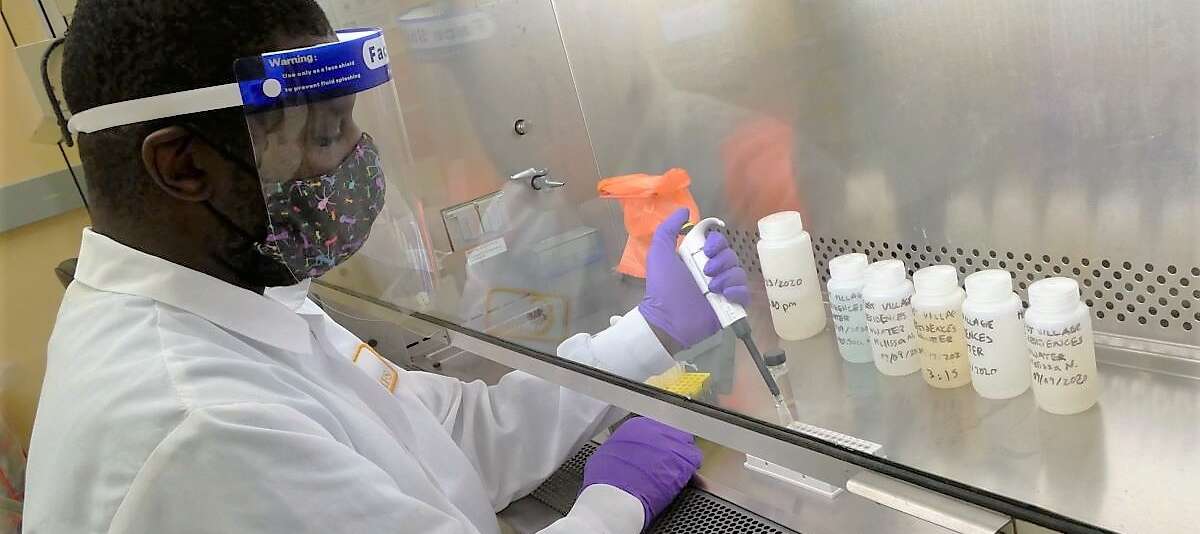
Preventing outbreaks of COVID-19 on university campuses could be achieved by testing the sewer system in specific areas of those campuses.
That is what University of Guelph research collaborators Prof. Lawrence Goodridge in Food Science, Prof. Ed McBean in Engineering, Prof. Andrew Papadopoulos in Population Medicine, and Prof. Heather Murphy in Pathobiology are about to do on the U of G campus.
With outbreaks on campuses across Canada a strong possibility, Goodridge and McBean are developing a wastewater testing methodology to detect levels of the SARS-CoV-2 virus, which is released in human feces. Increases in levels of the virus in the sewer system is an early warning sign that an outbreak may be underway on a campus.
The Globe and Mail recently featured the research, as did The Canadian Press, with reports appearing in several publications, including the National Post and the Toronto Star.
Goodridge, who is leading the project, said a positive test in wastewater does not necessarily mean there is an active infection in the population. The virus is shed in wastewater before a person shows symptoms and also potentially after a person has recovered, he said. The researchers are testing for elevated amounts of the virus.
Previous research has found the virus appears in wastewater roughly a week before it shows up in a population, said Goodridge, a food-borne and water-borne pathogen expert and director of the Canadian Research Institute for Food Safety at U of G. External partners in the study include Prof. Roger C. Levesque at Laval University’s Integrative and Systems Biology Institute, and Dr. Chrystal Landgraff of the Public Health Agency of Canada’s National Microbiology Laboratory.
“The University is being proactive,” Goodridge said. “If we find evidence of the virus in wastewater, it’s an indication that there is potentially a problem coming up. With that information, we can then take steps to take early action against that potential problem.”

Goodridge received funding from the University in the early stages of the pandemic, using it to develop wastewater testing processes for measuring community level exposure to the virus.
“Our researchers bring their phenomenal knowledge and skills to bear to make a difference,” said Malcolm Campbell, vice-president (research). “That’s why we knew it was essential to fund research like this when the pandemic hit. As we continue to grapple with the challenges of this pandemic, it is comforting to know that U of G innovation will be a vital tool in keeping not only our campus safe, but potentially our broader community as well.”
The project has progressed to the point where the research team is now gathering wastewater samples from a number of U of G residences.
“The data collected will have an immediate practical application because we can isolate the source of the infection by target testing in that area,” said Goodridge. “We appear to be the first in Canada to test a campus residence and use the data to try to make the campus safer.”
A wastewater sample, accumulated over the duration of a day, will provide reliable evidence of the amount of virus coming from a specific area where wastewater facilities are shared by a group of students, McBean said. From samples, taken throughout the week, it is possible to determine if a resurgence of cases is happening.
In the event of elevated levels of the virus, the information could be used to reinforce practices that have proven effective in controlling the spread of COVID-19, including physical distancing, mask wearing and handwashing. Additionally, testing could be carried out on that grouping of students, and those that test positive could then be isolated.
If used more widely, the process could help alleviate some of the pressure on COVID-19 testing centres by identifying schools or neighbourhoods where the virus is present and targeting individual testing more efficiently, said McBean, former Senior Canada Research Chair in Water Supply Security.
“This could work anywhere where we can access sewage effluent,” said Goodridge, adding that wastewater testing for the virus is happening in other places around the world.
The research will also shed light on issues that remain uncertain related to testing for the virus in wastewater, Goodridge added, including what is the best type and volume of sample to take.
“I’m thrilled that U of G has considerable wastewater expertise,” said Goodridge. “This project would not have come about without that. Wastewater surveillance is here to stay. There are food-borne pathogens, emerging pathogens and there will probably be another coronavirus so we are working to get out in front of this.”
Contact:
Prof. Lawrence Goodridge
goodridl@uoguelph.ca
Prof. Ed McBean
emcbean@uoguelph.ca
